
Primark is at home in food conglomerate insists boss
Associated British Foods says it is "good home" for Primark despite sugar slump dragging down profits

The best home for Primark is still as part of Associated British Foods, the boss of the conglomerate has insisted, despite a “magnificent year” for the discount clothing retailer being offset by a fall in profits from sugar.
Primark enjoyed a 16pc rise in revenues to £4.95bn in the year to September 13 and a 29pc growth in profits as consumers in France and northern Europe joined UK shoppers in flocking to the high street chain.
However, ABF said that sharp falls in the price of sugar “held back” group profits. Operating profits in the sugar business slumped by 54pc, which dragged down group operating profits down by 1pc. However, ABF reported that statutory pre-tax profits grew from £868m last year to £1.02bn in 2014.
City analysts have regularly questioned whether Primark would be more valuable as a separate business.
The clothing retailer has grown rapidly in the last decade by opening stores across the UK and expanding into Europe. Primark opened its 100th store in 2000 after 31 years of trading. It covered 1.4m sq ft of shopping space then but is now seven times larger. Earlier this year Primark confirmed that it would open stores in the US in late 2015, which will cost £200m.
George Weston, chief executive of ABF, said the conglomerate had “always been a good home for Primark and its people”.
He added: “Primark benefits from being part of the group. While that is true, it will remain part of the group.
“The governance, advice, and freedom to operate that we provide Primark with are all valuable. I think a lot of the good decisions have been influenced by ABF, such as acquiring the Littlewoods stores, the expansion into Spain and the expansion into Northern Europe.
“That was pushed by head office. Some of things it hasn’t done have also been influenced by head office. We provide the management team with freedom and time to run the business.”
Anusha Couttigane, retail analyst at Conlumino, said: “Improved perceptions of its quality and fashionability have helped Primark to break through the fashion snobbery.”
ABF said the slide in the sugar business was underpinned by the European Commission's decision to abolish sugar quotas from October 2017.
Charles Sinclair, the chairman of ABF, said: "We have seen increased competition as European producers position themselves for a post-quota market.This has resulted in a fall in prices that ABF expects to continue in 2015.
Mr Sinclair said: "We have seen increased competition as European producers position themselves for a post-quota market. This has driven a fall in prices which we expect to continue in 2015.
“We anticipate restructuring in the European sugar industry and, as the high stock levels are liquidated, we expect to see volatility in market prices.
"This structural change is painful, but AB Sugar has risen to challenges of this nature before, and does so this time with a programme of continuous performance improvement.
"We are one of the most efficient producers in the EU and will continue to take the necessary action to ensure that we are well placed to operate in the post-quota environment.”
Shares in ABF rose 95p, or 3.6pc to £27.66